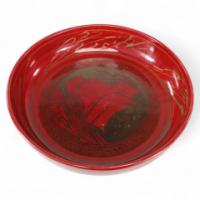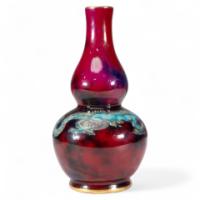Bernard Moore (1850–1935) was an English potter and ceramic chemist, best known for pioneering experimental flambé and specialised art glazes in the early twentieth century. Born in Normacot, Staffordshire, he entered his father’s pottery business as a teenager and later traded as Moore Brothers, producing fine china and ornamental wares at Longton. In 1905 he sold the family firm and set up a small studio in Stoke-on-Trent, where he focused on art pottery with richly worked flambé, copper red and reduced lustre glazes, often on relatively simple thrown forms.
Moore’s reputation rested on his technical mastery. He was elected president of the British Ceramic Society in 1902 and was widely consulted by other manufacturers on glaze chemistry, especially in relation to Chinese-inspired sang-de-boeuf reds and complex crystalline effects. His studio, active roughly 1905–1915 and assisted by decorators such as Dora Billington, produced highly collected vases, bowls and animal figures before closing, after which Moore continued as a consultant. Today his signed flambé pieces are regarded as key works of British art pottery, bridging Victorian manufacture and more experimental studio practice.



